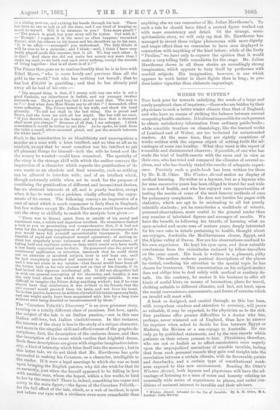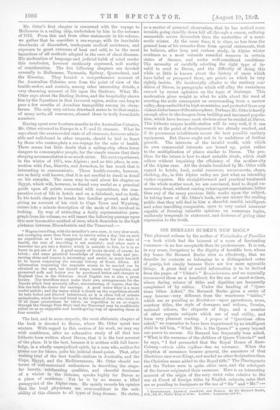WHERE TO WINTER.* Tins book goes far towards satisfying the
needs of a large and sorely perplexed class of inquirers,—those who are bidden by their
physicians to seek a better winter climate than that of England, and who have no means of striking the balance between several competing health-stations. It is almost i tnpossible for such persons to obtain satisfactory information from ordinary guide-books ; while scientific treatises on climatology, like the learned works of Lombard and of Weber, are too technical for uninstructed readers. At the same time, they are rightly suspicious of works written with the express object of setting forth the ad- vantages of some one locality. What they want is the report of &sensible and disinterested observer ; if possible, of one who has made the trial of health-resorts with the same end in view as their own, who has tried and compared the climates of several re- gions, and who has frankly stated the results of adequate experi- ence. Precisely such a guide-book has been written for them by Mr. R. H. Otter. His Winters Abroad makes no display of medical learning. He writes as a layman, but as a layman who for nine successive years has been obliged to travel fax and wide in search of health, and who has enjoyed rare opportunities of testing the merits of some of the most famous methods of cure- for pulmonary complaints. He does not burden his pages with statistics, which are apt to be misleading to all but purely scientific students ; yet he contributes a multitude of minute, personal observations, more useful to the general reader than any number of tabulated figures and averages of results. We have the benefit, in following his travels, of learning what an open-minded and acute man of mature years, deeply interested for his own sake in details pertaining to health, thought about sea-voyages, Australia, the Mediterranean shores, Egypt, and the Alpine valley of Davos. Nor are his observations confined to his own experience. He kept his eyes open, and drew valuable conclusions from the vicissitudes endured by fellow-travellers on the same quest. His book is written in a pleasant, pithy style. The author eschews poetical descriptions of the place% he visited, confining his attention to the special topic he has chosen for treatment. This concentration on his subject-matter does not oblige him to deal solely with medical or sanitary de- tails. On the contrary, he makes it his business to offer all kinds of useful hints on means of locomotion, plans for travel, clothing suitable to different climates, and last, not least, upon the social conveniences, amusements, and forms of exercise which an invalid will meet with.
A book so designed, and carried through, as this has been, with scrupulous candour and attention to accuracy, will prove as valuable, it may be expected, to the physician as to the sick. Few problems offer greater difficulties to a doctor who has, perhaps, never wintered out of England, than how to answer his inquirer when asked to decide for him between Egypt or Madeira, the Riviera or a sea-voyage to Australia. • He can only go by published statements, and by the rare reports whirl patients on their return present to him. Physicians, therefore, who are not so foolish as to affect omniscience seize eagerly upon the unprejudiced narrations of sensible invalids, feeling that from such personal records they gain real insight into the correlation between a certain climate, with its favourable points and drawbacks, and a certain type of constitutional weak- ness exposed to this new environment. Reading Mr. Otter's Winters Abroad, both laymen and physicians will have the ad- vantage of listening to a man of sense and. honesty relating an unusually wide series of experiences in places, and under con- ditions of eminent interest to invalids and their advisers.
• Winters Abroad, Wended, for the Titre of Inratide, By R. IL Otter, M.A., London: John Murray.
Mr. Otter's first chapter is concerned with the voyage to Melbourne in a sailing ship, undertaken by him in the autumn of 1872. From this and from other statements in his volume, we gather that he considers a sea-voyage, with its inevitable drawbacks of discomfort, inadequate medical assistance, and exposure to great extremes of heat and cold, to be the most hazardous of all methods adopted in the cure of chest diseases. His moderation of language and judicial habit of mind render this conclusion, however cautiously expressed, well worthy of consideration, The five following chapters are devoted severally to Melbourne, Tasmania, Sydney, Queensland, and the Riverina. They furnish a comprehensive account of the Australian Colonies seen from the point of view of the health-seeker, and contain, among other interesting details, a very charming account of life upon the Stations. What Mr. Otter says about the Darling Downs, and the hospitality shown him by the Squatters in that favoured region, makes one long to pass a few months of Arcadian tranquillity among its sheep- farms. The only very serious drawback seems to be that snakes of many sorts, all venomous, abound there in truly formidable numbers.
Having spent over fourteen months in the Australian Colonies, Mr. Otter returned to Europe in a P. and 0. steamer. What he says about the overcrowded state of all steamers, however admir- able and well-found in other respects, should be laid to heart by those who contemplate a sea-voyage for the sake of health. There seems but little doubt that a sailing-ship offers fewer dangers to consumptive people, for the simple reason that their sleeping accommodation is so much airier. His next experiment, in the winter of 187, was Algiers ; and on this place, in con- nection with Pau, Biarritz, and Arectchon, he has much that is interesting to communicate. These health-resorts, however are so fairly well known, that it is not needful to dwell in detail on his remarks. The same may be said about his chapter on Egypt, which will, however, be found very useful as a practical guide upon all points connected with expenditure, the com- parative cost of life in hotels and on a dababeah, and so forth. In his tenth chapter he breaks less familiar ground, and after giving an account of his visit to Cape Town and Wynberg, enters into a minute description of the mode of life involved in treking. By way of extracting a fairly representative para- graph from his volume, we will insert the following passage upon this new locomotive method of cure, which flourishes in the high plateaux between Bloemfontein and the Transvaal :— " Wagon-travelling, with the traveller's own oxen, is very slow work, not averaging more than from ten to twelve miles a day, but as such an expedition as I have suggested is only made for the sake of health, the rate of travelling is not material ; and when once a traveller has got into a district which is suitable to him' he is in no hurry to get out of it. A good supply of books should, of course, be taken ; and some practical knowledge of skinning birds and pre. serving skins and insects is interesting and useful, as much has still to be learnt respecting the natural history of South Africa. All information respecting the requisite stores to be carried can be
• obtained on the spot, but tinned soups, meats, and vegetables, and preserved milk and butter can be purchased better and cheaper in England than in the Colonies. Good English tea is also a great luxury. The travellers must make their own arrangements for the liquors which they severally affect, remembering, of course, that the less the bulk the easier the carriage. A good water filter is a most useful article ; and the water which is drunk on the expedition should be both boiled and filtered beforehand, as it is often full of minute animalcules, which live and breed in the bodies of those who drink it. If all these precautions be taken, an expedition in an ox.wagon through the Orange Free State and the Transvaal may be confidently relied on as an enjoyable and health-giving way of spending three or four months."
The last, and in some respects, the most elaborate, chapter of the book is devoted to Davos, where Mr. Otter spent two winters. With regard to this section of his work, we may say with confidence, after an exhaustive study of all that has hitherto been written about Davos, that it is the best account of the place. It is the best, because it is written with full know- ledge, in a wholly unprejudiced spirit, by a man who, neither for praise nor for blame, quits his judicial stand-point. That, after making trial of the best health-stations in Australia, and the Cape, Egypt, and the Mediterranean, Mr. Otter should use terms of wen-restrained enthusiasm in describing the singu- lar beauty, exhilarating qualities, and cheerful freshness of a winter in the Crisons, speaks highly for Davos as a place of residence. Yet he is by no means a blind panegyrist of the Alpine cure. He openly records his opinion that the local physicians are over-confident in the suit- ability of this climate to all types of lung disease. He states, as a matter of personal observation, that he has noticed some invalids going steadily down hill all through a season, suffering meanwhile severe discomfort from the austerities of a semi. arctic winter. At the same time, it is clear, no less from the general tone of his remarks than from special statements, that he believes, after long and curious study, in Alpine winter residence as a most valuable remedial measure in certain. states of disease, and under well-considered conditions- The necessity of carefully selecting the right type of in- valid to send to Davos, and the difficulty of doing this while so little is known about the history of cases which have failed or prospered there, are points on which he very rightly insists. He incidentally alludes to the sanitary con- dition of Davos, in paragraphs which will allay the uneasiness caused by recent agitation on the topic of drainage. This moderation gives weight to what he adds about the need of averting the evils consequent on overcrowding from a narrow valley, deep-embedded in high mountains, and protected from any violent disturbance of the atmosphere. Perhaps Mr. Otter is hardly enough alive to the dangers from building and increased popula. tion, which have become most obvious since he resided at Davos. This hitherto unique health-station will do very well, if it can remain at the point of development it has already reached, and if its permanent inhabitants secure the best possible sanitary equipment. But Davos ought not to be ambitious of further growth. The interests of the invalid world, with which its own commercial interests are bound up, point rather to the multiplication of places similar to Davos. The pro. blem for the future is how to start suitable rivals, which shall relieve without impairing the efficiency of the m other-city of the Alpine cure. All the details furnished by Mr. Otter with regard to hotels, food, social resources, amusements, shops, clothing, c4sc., in this Alpine valley are just what an intending visitor requires. His straightforward and practical treatment of the whole matter must, we are convinced, tend to dispel un- necessary dread, without raising extravagant expectations, better than any of the many previous little works upon the subjects In taking leave of Mr. Otter's book, we can assure the reading public that they will find in him a cheerful, candid, intelligent, and sober travelling companion, open to very varied interests, capable of forming valuable opinions on numerous topics, uniformly temperate in statement, and desirous of giving clear expression to the truth.































 Previous page
Previous page